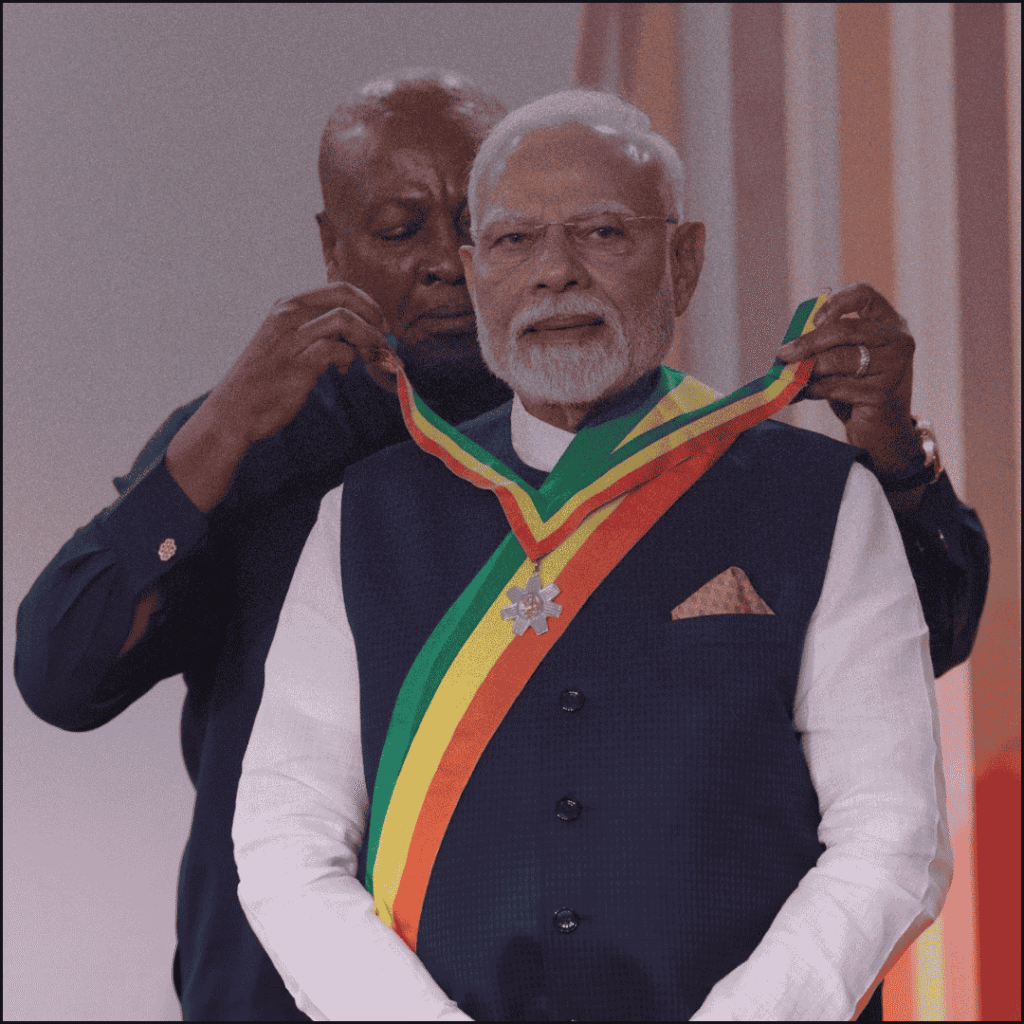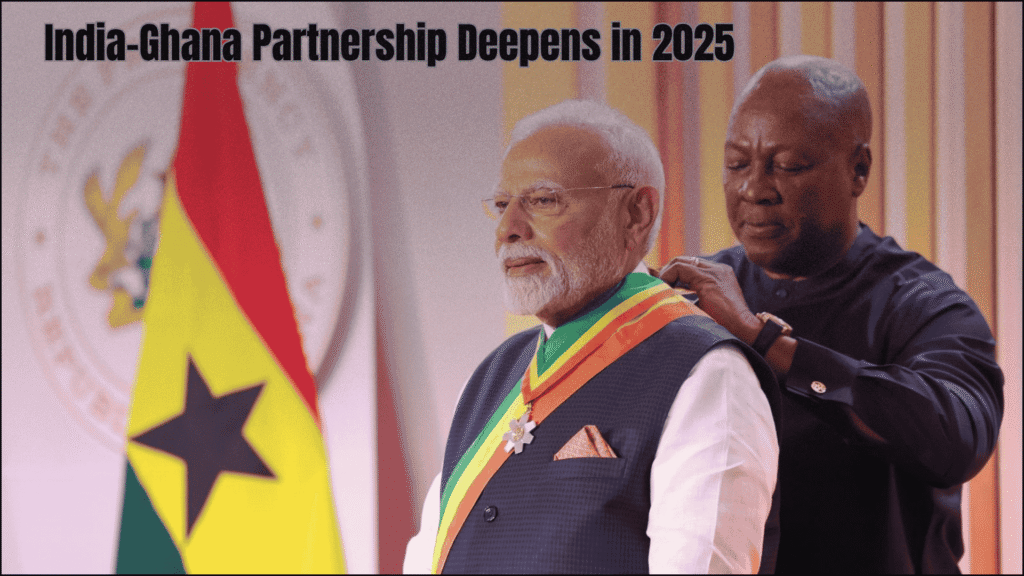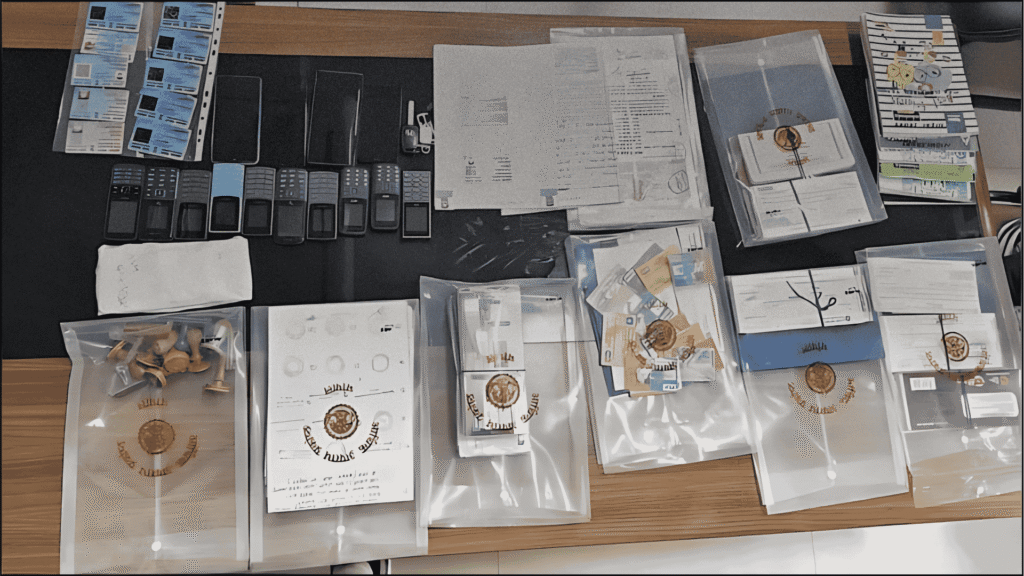
On July 3, 2025, Prime Minister Narendra Modi made history as the first Indian Prime Minister in over three decades to visit Ghana, a key player in West Africa’s economic and political landscape. The visit, warmly received by Ghanaian President John Dramani Mahama, elevated India-Ghana relations to a Comprehensive Partnership, signaling a robust commitment to mutual growth. The signing of four Memorandums of Understanding (MoUs) in culture, health, standardization, and institutional dialogue, alongside discussions on defense, security, and rare earth mineral mining, underscored a strategic intent to deepen ties and counter China’s growing influence in Africa. This blog explores the outcomes, implications, and broader geopolitical context of this landmark visit.
Key Outcomes of the Visit
1. Four Memorandums of Understanding (MoUs)
The delegation-level talks between PM Modi and President Mahama resulted in the signing of four pivotal MoUs, each designed to foster collaboration in critical areas:
- Cultural Exchange Programme (CEP): This MoU aims to strengthen people-to-people ties through exchanges in art, music, dance, literature, and heritage. By promoting cultural understanding, India and Ghana seek to enhance tourism and deepen their historical bonds.
- Bureau of Indian Standards (BIS) and Ghana Standards Authority (GSA): This agreement focuses on cooperation in standardization, certification, and conformity assessment, paving the way for improved trade quality and regulatory alignment.
- Institute of Traditional and Alternative Medicine (ITAM), Ghana, and Institute of Teaching and Research in Ayurveda (ITRA), India: This MoU promotes collaboration in traditional medicine education, training, and research, leveraging India’s expertise in Ayurveda to support Ghana’s healthcare ambitions.
- Joint Commission Meeting: This agreement institutionalizes high-level dialogue to ensure regular reviews of bilateral cooperation, fostering sustained engagement across sectors.
These MoUs reflect a multifaceted approach to strengthening ties, blending cultural affinity with economic and strategic collaboration.
2. Defense and Security Cooperation
A significant focus of the visit was enhancing defense and security ties. Ghana expressed keen interest in India’s defense equipment, training, and systems, particularly to address regional challenges like terrorism in the Sahel and piracy in the Gulf of Guinea. PM Modi emphasized a shared commitment to counter-terrorism, stating, “Terrorism is the enemy of humanity. We thank Ghana for its cooperation in our fight against terrorism.” Both leaders agreed to deepen cooperation in areas such as armed forces training, maritime security, defense supply, and cybersecurity, guided by the mantra of “security through solidarity.”
Ghana’s condemnation of the April 2025 Pahalgam terror attack in India further solidified this partnership. The discussions also highlighted a mutual stance on global conflicts, with PM Modi reiterating, “This is not the era of war; problems should be resolved through dialogue and diplomacy.”
3. Rare Earth Mineral Mining and Countering Chinese Influence
A cornerstone of the visit was a strategic agreement on rare earth mineral mining, aimed at reducing India’s dependence on China, which dominates the global supply chain for these critical resources. Essential for electric vehicle (EV) batteries, wind turbines, and electronics, rare earths are vital for India’s green energy ambitions. The deal with Ghana positions India to secure a stable supply, challenging China’s monopoly and bolstering supply chain resilience. Indian companies, including Khanij Bidesh India Ltd and NMDC Ltd, are set to collaborate on exploration and mining, aligning with Ghana’s growing role in the global lithium supply chain.
This move is part of India’s broader mineral diplomacy, evident in PM Modi’s five-nation tour, which also includes resource-rich countries like Argentina and Namibia. By forging such partnerships, India aims to secure its economic future while supporting Ghana’s development as a key player in Africa’s mineral economy.
4. Economic and Digital Collaboration
The visit set an ambitious target to double bilateral trade from $3 billion to $6 billion within five years. Indian companies have already invested nearly $2 billion in 900 projects in Ghana, spanning infrastructure, agriculture, and manufacturing. PM Modi offered to share India’s expertise in UPI-based digital payments to bolster Ghana’s financial technology infrastructure, a move that could transform its digital economy. Additionally, India committed to supporting Ghana’s agricultural sector, with President Mahama seeking collaboration to develop Ghana as a “food basket” for enhanced food security.
5. Global South Solidarity
Both leaders reaffirmed their commitment to the Global South, with PM Modi highlighting the African Union’s permanent G20 membership under India’s presidency as a “matter of pride.” Ghana’s invitation to join the Global Biofuels Alliance further cements this partnership. The visit underscores India’s role as a co-traveler in Ghana’s development journey, emphasizing shared democratic values and sustainable development.
Geopolitical Significance
The visit comes at a time when Ghana is undergoing significant economic restructuring, and India’s support signals a deepening of ties with Africa. By focusing on critical minerals and defense, India is strategically positioning itself to counter China’s economic dominance in the region. China’s control over rare earth exports has posed challenges for India’s green tech ambitions, and the Ghana deal is a direct response to this. Moreover, India’s emphasis on dialogue, diplomacy, and counter-terrorism aligns with its broader foreign policy of fostering peace and stability in the Global South.
Conclusion
PM Modi’s historic visit to Ghana on July 3, 2025, has laid the foundation for a stronger, more dynamic India-Ghana partnership. The four MoUs, coupled with agreements on defense, security, and rare earth minerals, reflect a shared vision for progress. By targeting a doubling of trade, enhancing digital infrastructure, and countering Chinese influence, this visit marks a pivotal moment in India’s engagement with Africa. As PM Modi aptly stated, “India is not just a partner but a co-traveler in Ghana’s journey of nation-building.”
Resources



